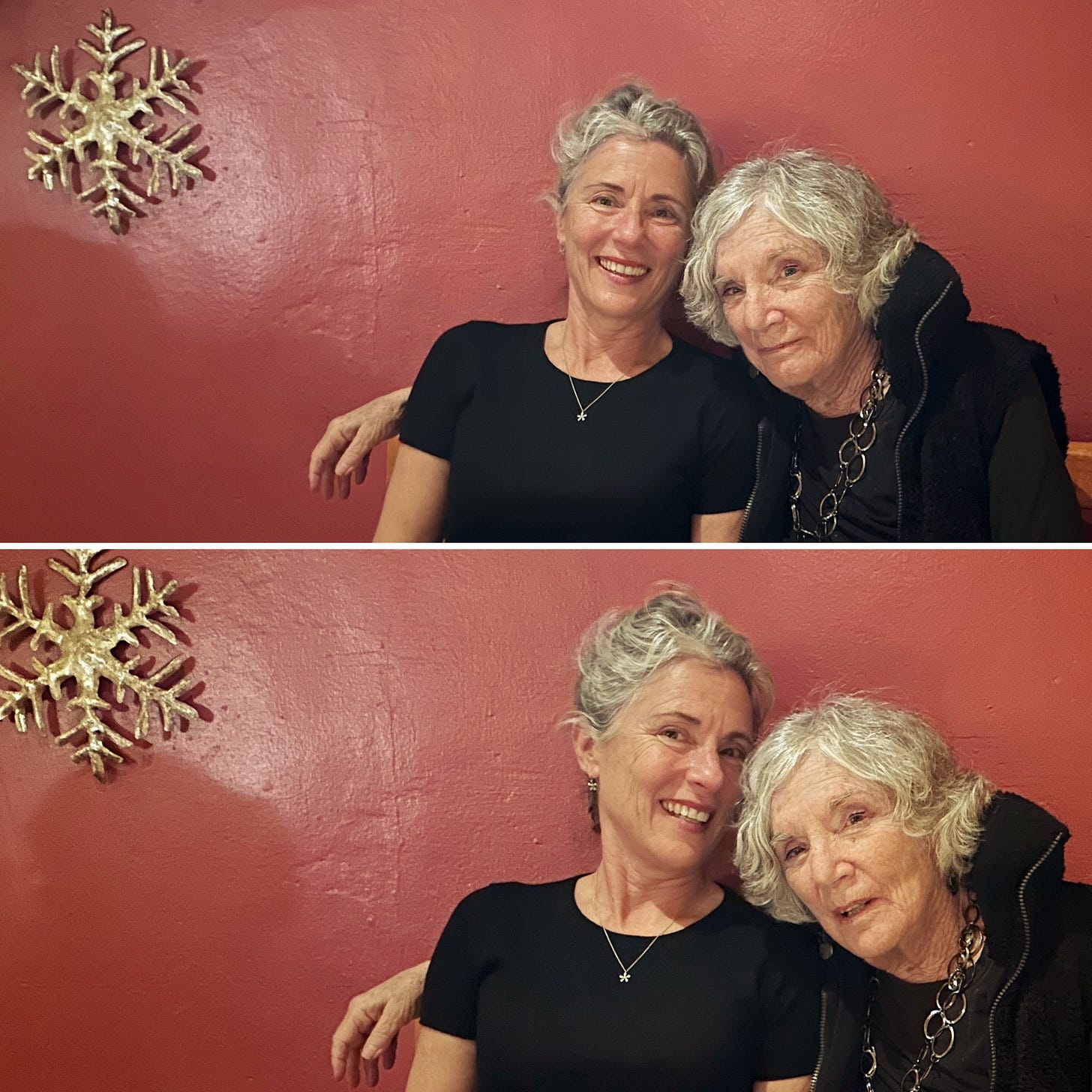A good mimic? What AI did with my voice and why I hate it
+++ advice, a book, a writing prompt, and a recipe
Dear Ones,
I’m visiting my mother (Hi Mom!) and I’m worried. So much so it prompted a long conversation with my therapist about how to help people who don’t want our help. My mom is 84 and lives on her own, mostly doing well but there are a few causes for concern. The trouble is, I think she sees me like this elephant, a giant presence who barges into her home, sits down and takes over.

What I want to share with you is the excellent advice my therapist gave me:
Normalize the heck out of the difficulty of living on one’s own at an advanced age. Sprinkle earnest compliments like fairy dust! 🧚🏻♀️🧚🏻♀️🧚🏻♀️ (Adjust this to whatever you may be dealing with in your family or friendships. Normalize the situation. Tell your person, you’re not alone! Everyone struggles!)
Next try to get them to recognize that you’re there as a help, not critic. (This one is hard. How can we comment on what we think might not be working and not be seen as a critic? I think we must lean hard into number one.)
Ask your person: Can we have honest conversations about struggles…paying bills, keeping house, personal care…without you having a sense of insult?
I’m carrying around this advice like a crib sheet for an exam. If you have additional advice or skills, let me know, please. Asking for a friend!
read:
I’ve just finished my patchwork reading of DEMON COPPERHEAD, by Barbara Kingsolver. I started it months ago and put it down as it was just too sad and I’ve been on a campaign to guard my borders from the un-fun. Then, as you may recall, I heard Kingsolver speak at Literary Arts in Portland and I decided to dive back in, with the company of friends. I’ve been offering a free book conversation on alternating Sunday mornings. We broke the book into sections and the meetings have been insightful and fantastic. I am so grateful to have company. In fact, I am considering making the book conversations a permanent fixture. If you’re interested in joining in, have a long book you want to read in chunks with new pals (THE COVENANT OF WATER anyone?) drop me a line with your suggestion.
Meanwhile, if you’ve not yet read DEMON, I highly encourage diving it. Yes, the book is hard. Yes, Appalachia has been targeted by Purdue Pharma and the Sackler family. Yes there are too many senseless deaths, families destroyed. And, there is love and light and a glimpse at redemption. Consider this moment when Demon is on the precipice of falling into addiction, and losing his virginity with a girl he loves:
…we parked, some random place, a ridge top gravel road that ended at a chain-link gate. Down below, a wrecked valley and stairstep tailings of an old mine with the reclamation trees planted the way they do, in rows, like the hair dots of a doll that’s been scalped. The moon was out bright and hard, hitting these bean-shaped acid ponds down there, making them pretty. I was keyed up, nerves being my home turf. But less so after Dori said it was first time for her too.
Beauty in the wrecked landscape, acid ponds and the scalped doll, the cadence of the language…I’m in.
In tandem with reading the book I watched both DOPESICK which is fantastic and horrifying, and THE BOLD AND THE BEAUTIFUL, about the artist/activist Nan Golden.
Next on my list: WELLNESS, by Nathan Hill. ABSOLUTION, by Alice McDermott. What’s on your TBR? Please let me know so I don’t miss out.
Check my read.write.eat. Bookshop Store, where you will find many of the books I've recommended in the newsletter. Buying books from my shop is a way you can be a friend to the newsletter.
write:
A friend asked ChatGBT to write a paragraph in the style of Natalie Serber and then sent it to me. (Yes, my books were scraped by the program.) I’ve attached it below with editorial comments from me, the real Natalie Serber!
In the dimly lit kitchen, where the scent of simmering nostalgia [NS1] clung to the air like a comforting shroud,[NS2] she moved with the ease of someone intimately familiar with the dance of pots and pans[NS3] . The worn apron tied snugly around her waist bore the stains and stories of countless family meals, [NS4] each splatter a testament to the joy and chaos of shared dinners. Her hands, weathered yet graceful, orchestrated a culinary symphony, the clatter of utensils and the hiss of sautéing memories [NS5] blending into a melody that spoke of tradition and whispered secrets. As she stirred the pot with a rhythmic cadence that echoed the heartbeats of generations, one couldn't help but feel a sense of belonging—a place where flavors intertwined with tales, and every bite carried the weight of a shared history.[NS6]
[NS1]What the heck does nostalgia smell like? Please use concrete details to bring the writing to life!
[NS2]Too many metaphors that don’t say anything. This is all babble.
[NS3]Evokes a Disney musical.
[NS4]The stains of stories…WTF?? If you want to include stains be specific… the smear of pancake batter her son made on the dark morning before he left for college/the war/disappeared…something that has meaning and links to the emotional life of the character
[NS5]This actually makes my teeth hurt from the cloying sweetness.
[NS6]NOTHING HAPPENS
Here is a real paragraph from me. Also a woman in her kitchen, from my story, “Electro Smog” a chapter from my WIP.
She’d roast the chicken for dinner since everyone loved some part of the bird. She’d mash potatoes. Martin might make it home from the hospital in time to join them. It could be good. Maybe she was sometimes bent out of shape, but not really at her daughters, at herself, at the way life complications amassed like hairs in the drain. She preheated the oven. Rinsed and patted dry the chicken. Lemon slices and onions, a few dates and chunked carrots snugged around the chicken in the roasting pan, she drizzled olive oil and sprinkled flaky salt and grinds from the pepper mill, another squeeze of lemon. Soon the scent of roasting onions filled the room. When the bird was nearly done, she brushed it with honey and a smattering of thyme leaves.
It took three times calling Sheila to the table before she deigned to join them. Barrett held her hand out for Sheila’s phone.
“I need it.” Sheila’s half-braided hair tumbled over one shoulder. A pink bra strap slipped down her bare arm.
Barrett stood firm.
“MOM. Oh my god. You’re so embarrassing.” She thrust her hand behind her back. “You’re not my boss. You’re triggering me.”
“You know what triggers me? The word trigger.” She tried to smile as she said this. “Phone please.”
Here’s a PROMPT:
Have you heard of the ladder of abstraction? This is a tool I share with my students and clients. The idea is, you want to avoid the middle of the ladder—the generalizations, and bland language, the babble that says nothing. The rungs at the top are where you get to talk about big things, big ideas, and truths that ring with the reader. Much of your writing and descriptions should be rooted at bottom of the ladder where you have put the reader in scene. These lower ladder rungs are where you fire up mirror neurons with concrete sensory language.
Consider this moment from another story of mine, “Reasons to Love.”
It was true, Janie and her friends were too loud in the halls, slamming locker doors, braiding each other’s hair. Frequently stoned, they tossed peanut M&Ms high in the air and lunged to catch the candy in their glossy mouths. They laughed inappropriately in biology class. It wasn’t confidence that made Janie loud, it was fear of being invisible, the way she’d always felt beside her perfect brother, the way she felt when she wasn’t with her friends.
Look at a scene in your work-in-progress. Are there gross generalizations as we saw in the AI paragraph at the top of this section? Give your reader concrete details, put them in the scene with specific language and then deliver the truths, the “fear of being invisible” moments that stick the landing.
eat:
We are still in Santa Cruz, visiting family and friends and enjoying the sunsets (see below!). And, I’m feeling ready to head home, to zazz up our place with holiday decorations and to cook for family and friends in Portland. First up on my list:
Honey-Roasted Brussels Sprouts With Harissa and Lemon Relish, from my fav kitchen personality and chef Alison Roman and NYTs Cooking (I love her cookbooks, here and here and here, all of which would make excellent gifts.)
2T honey
1½T harissa
5T olive oil
1½ lbs brussels sprouts, trimmed, halved lengthwise
Kosher salt and black pepper
½ lemon, rind included, seeds removed, finely chopped
½ c parsley, tender leaves and stems, finely chopped
½ sm shallot, peeled and finely chopped
Heat oven to 450 degrees.
In a small bowl, combine honey, harissa and 2 tablespoons olive oil. Mix in with brussels sprouts on a rimmed baking sheet. Season with salt and pepper and roast, tossing occasionally until sprouts are tender and lightly charred around the edges, about 13 to 18 minutes.
While sprouts cook, combine lemon, parsley, shallot and remaining 3 tablespoons olive oil in a small bowl. Season with salt and pepper and set aside.
Top roasted brussels sprouts with lemon relish before serving.
The thing I love about this recipe is the lemon relish. Right? I mean lemon, parsley, shallot and olive oil, maybe with a few chili flakes tossed in, what wouldn’t it go with? Tofu cubed and sautéed in olive oil, yes please! Roasted butternut squash? Why not. Chicken? Absolutely! It almost seems I could smear it on my face to promote collagen production!
Next time around I’m bringing you a guest post from a wonderful writer. You’re going to LOVE Becky Tuch! I’m lucky to be in a writing group with her so I’m privy to her beautiful writing and I benefit from her smart comments on my work. Becky is the editor of LIT MAG NEWS and will have much to share.
Looking for a last minute gift? Might I humbly suggest:
Stanley loves the sunshine!
If you aren't on my mailing list, you can subscribe below. And, if you'd like to buy my books, you can do so here and here. If you'd like to support the newsletter, please like, comment, and share with your funny and fun friends with the buttons below. When you do, I get an endorphin buzz.
Remember to tell your people you love them, and take good care of your skin.
xN









yes, Demon Copperhead was a difficult read...and i couldn't put it down. i really appreciated hearing the recording of the Literary Arts event you attended...the conversation between Barbara Kingsolver and Jess Walter. her love for Demon and all the characters in the novel...and most importantly, Appalachia. (podcast: The Archive Project, Dec 3rd.) a reminder that we can love difficult people, real or fictional.
safe travels home!
Oh, Demon Copperhead, how I love you so...